FOR INDEPENDENT LIVING COMMUNITIES
Is your staff frequently asked to handle assisted care tasks or assist residents in finding personal care services?
We recognize the challenges in providing community care and maintaining resident satisfaction. Many independent living communities experience staff overwhelmed with assisted care requests, leading to stress and suboptimal outcomes for residents. Gravitii can help by connecting your residents directly to care services, easing the workload for your team.
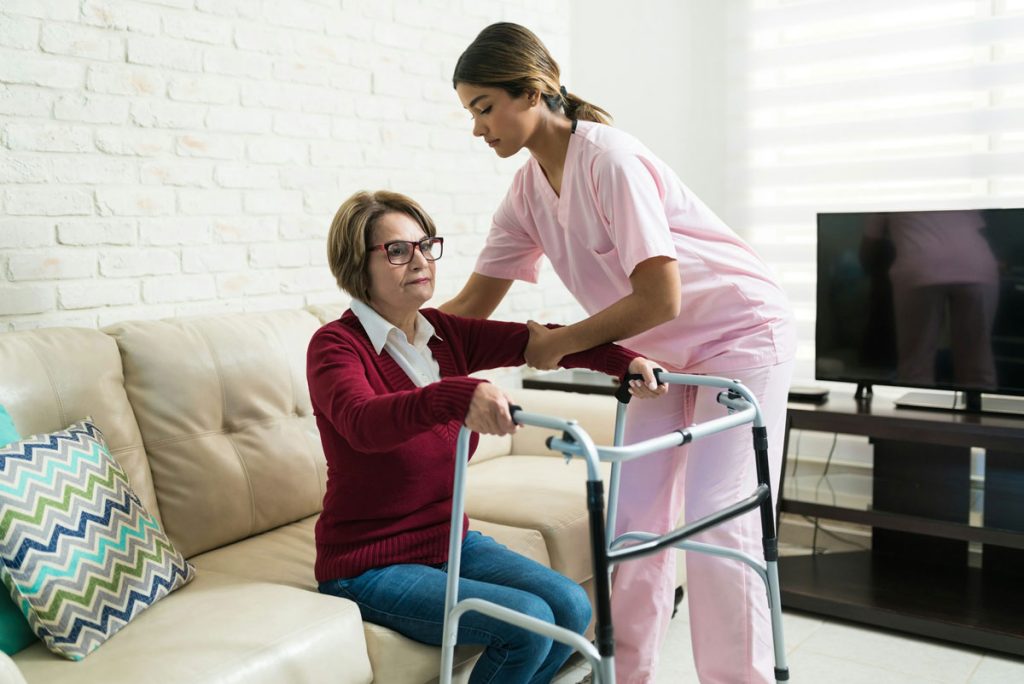
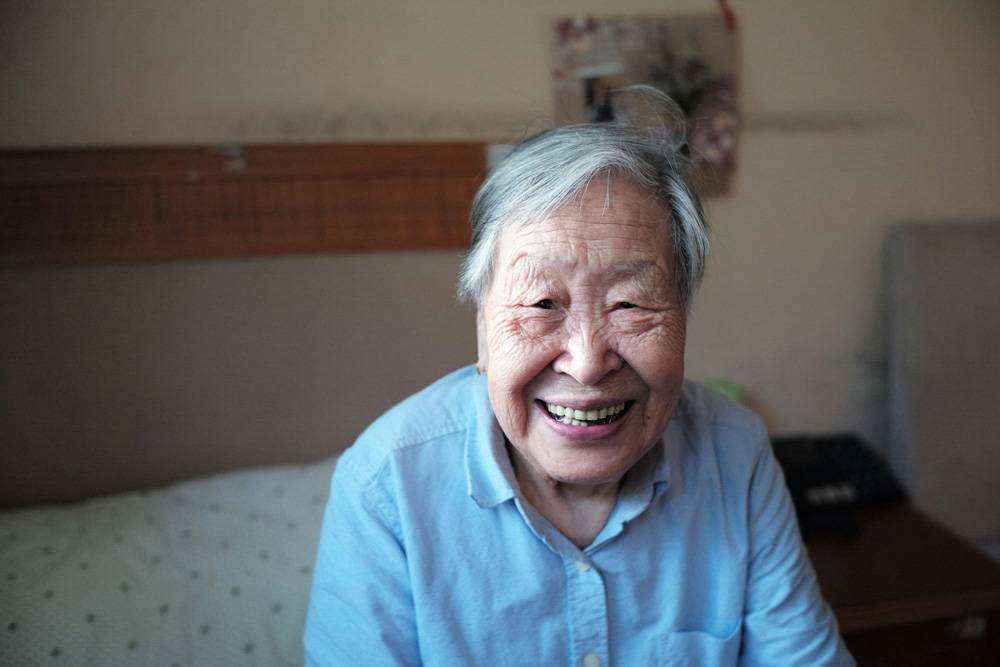
FOR NON-PROFIT SENIOR ORGANIZATIONS
Are you dissatisfied with the current home support options available for seniors in your community?
Gravitii offers community care solutions that work effectively in both remote and urban areas. We understand your commitment to supporting seniors and their families, and we equip you with tools to connect them with essential, reliable care.
FOR DOCTORS, NURSES, AND HOSPITALS
Are you aiming to reduce patient visits and ensure their well-being at home?
Gravitii bridges the gap between hospital discharge and community care services, expediting access to reliable community care support to shorten hospital stays and reduce readmission risk. This enhanced connection helps patients and their families manage and thrive at home.

A BETTER WAY TO SUPPORT FAMILIES
A platform that links your clients and patients with verified care providers
Through our new Concierge Role, Gravitii provides families with direct access to the community care support they need. This allows your team to better serve residents, patients, and their families so you can focus on your primary responsibilities.
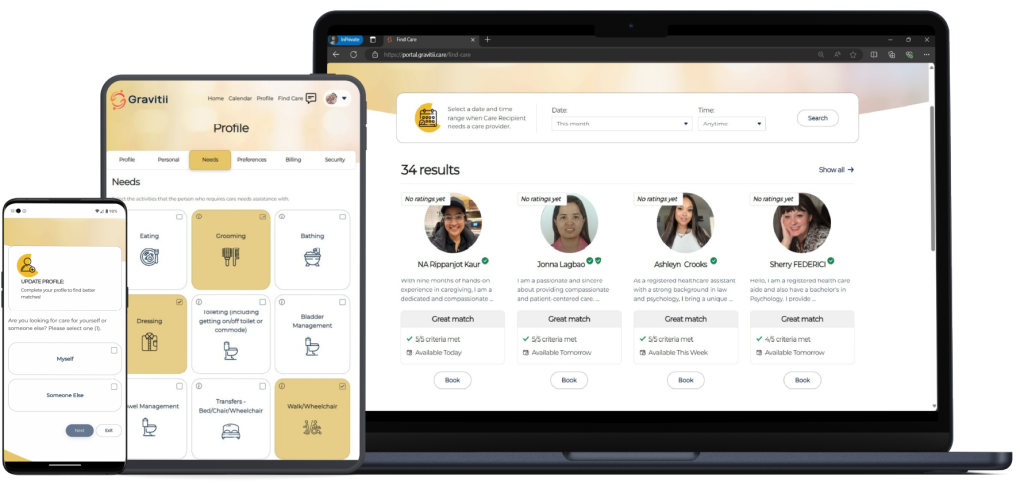
REGISTER FOR FREE
How does it work?

1
Book a demo call and have us create a concierge role account for you
Email us at contact@gravitii.care to request a demo call.
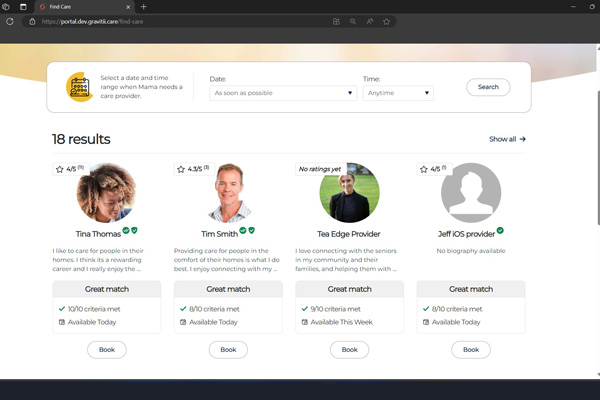
2
Enroll your people with their own accounts
Set up client profiles and oversee or manage their care.

3
Enjoy full visibility of care provided and happier families!
Be as involved in your families’ care as you want.
BENEFITS FOR YOUR ORGANIZATION
What are the benefits of joining Gravitii?
As a senior organization or healthcare professional, you have a bird’s eye view of the care provided to the families you serve.
The Gravitii platform is your solution to overseeing and improving the safety, happiness, and longevity of your community.

Peace of mind for healthcare workers

Know who provides care to families

Happier and healthier seniors

Reduced turnover or readmission

Lower risk of senior injury or harm
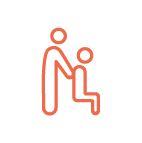
Help with hospital recovery
FREQUENTLY ASKED QUESTIONS
You have questions, we have answers
How much does it cost?
Signing up to find care on Gravitii is free for clients, providers, and businesses.
Care providers on the Gravitii platform set their own rates so the cost will vary depending on which care provider you choose and what services they offer. The average hourly cost for home care in British Columbia is approximately $40/hour. Rates may be determined by demand, experience, or specialty qualifications. Gravitii encourages home care providers to offer competitive rates. In addition to the Provider’s fee, Gravitii charges a 10% service fee plus applicable taxes and Stripe charges a small service fee for processing payment. The total cost is visible to you before sending the booking request. Your credit card isn’t charged until a care provider confirms your booking and completes the services you requested.
Is Gravitii available in my area?
Gravitii is currently operating in British Columbia. We started close to home in the Central Okanagan and the Greater Victoria regions and new care providers are signing on every day across British Columbia. Please create an account or contact our team to confirm whether we serve your area.
What kind of support can we expect from care aides?
Gravitii requires all care providers to be registered and in good standing with the BC Care Aide and Community Health Worker Registry (cachwr.bc.ca).
Health (Home) Care Aides, HCAs, learn various skills to provide quality care to clients in a home setting. These skills typically cover the supportive aspects of medical and non-medical care, including:
- Personal Care Assistance – HCAs help clients with activities of daily living (ADLs), including bathing, dressing, grooming, and toileting.
- Mobility Assistance – They assist clients with mobility, transfers, and exercises to improve strength and flexibility.
- Medication Management – HCAs may be delegated to administer medications, track doses, and ensure clients take their medications as prescribed.
- Vital Sign Monitoring – They learn how to measure and record vital signs, such as blood pressure, pulse, temperature, and respiratory rate.
- Nutrition and Meal Preparation – HCAs prepare meals, assist with feeding, and help clients follow dietary restrictions or special diets.
- Hygiene and Infection Control – They are trained in maintaining a clean and safe environment, following infection control protocols, and preventing the spread of illnesses.
- CPR and First Aid – HCAs often have basic training in cardiopulmonary resuscitation (CPR) and first aid to respond to emergencies.
- Record Keeping – They maintain accurate records of care provided, including medications administered and changes in the client’s condition.
- Communication Skills – HCAs learn effective communication to understand and meet clients’ needs, provide emotional support, and report any concerns.
- Cognitive Support – For clients with cognitive impairments, HCAs provide support and engage in activities that stimulate memory and cognitive function.
- Dementia Care – Specialized training in dementia care equips HCAs to care for clients with Alzheimer’s or other forms of dementia.
- Client Safety – They ensure the safety of clients by identifying and mitigating hazards in the home environment.
- Palliative Care – Training in palliative care enables HCAs to provide comfort and support for clients with serious illnesses at the end of life.
- Pediatric Care – Specialized skills are necessary for caring for children, including understanding their unique developmental needs.
- Mental Health Support – They may be trained to support clients with mental health challenges and provide emotional support.
- Cultural Competency – Understanding and respecting the diverse cultural backgrounds of clients is crucial for providing culturally sensitive care.
- Proper Body Mechanics – To prevent injuries, HCAs learn how to lift, move, and assist clients safely using proper body mechanics.
- Documentation – Keeping detailed and accurate records is essential for tracking care and sharing information with other healthcare professionals.
The specific skills and training required can vary based on regulations and the individual needs of clients. HCAs often undergo formal training programs, which may include classroom instruction and hands-on clinical experience. Continuous education and ongoing training help HCAs stay current with best practices in home care.
How can I trust the care providers available on your platform?
Ensuring that a home care provider is trustworthy is essential to the safety and well-being of the patient. Although care providers are required to upload a confirmation letter that they are in good standing with the BC Care Aide and Community Health Worker Registry, here are several steps an individual can take to verify the trustworthiness of a home care provider:
- Background Checks – Gravitii has integrated with CERTN, a background check platform, so you can now see what background checks a provider has completed next to their name in your search results on Gravitii. This includes a criminal record check, identity verification check, soft check and driver’s abstract. If they don’t display the background check verification badge
, you might wish to ask them directly if they would be willing to have a background check done.
- Licensing and Certification – Verify that the home care provider is appropriately licensed, certified, and qualified to provide the specific level of care required. Different levels of care may require different certifications. Look for the verification badge
that they’re in good standing with the BC Care Aide registry next to their name in your search results on Gravitii.
- References – Request and contact references from the home care provider and ask about their previous experiences with clients. This can help you gauge their reliability and professionalism.
- Experience and Training – Inquire about the provider’s experience and training. A trustworthy provider should have relevant experience and up-to-date training in the specific care needs of the individual.
- Reviews and Ratings – Read the provider’s reviews and ratings on Gravitii. While not the sole basis for trustworthiness, positive reviews can be a good sign.
- Insurance and Bonding – Ensure that the provider has the necessary insurance and bonding in case of accidents or incidents that may occur during care. You can now see whether a provider has provided proof of liability insurance and WCB in your search results on Gravitii. Look for the verification badge
next to their name.
- Transparency – The provider should be transparent about their services, fees, and any potential additional costs.
- In-Person or Telephone Meeting – Whenever possible, meet the home care provider in person or on the telephone before they start providing care. This allows you to assess their demeanour, professionalism, and compatibility with the individual who needs care. All care providers on Gravitii should offer a free 30-minute phone consultation service so that you can get to know them.
- Care Plan – Discuss and review the care plan with the provider, ensuring that they understand the individual’s specific needs and preferences.
- Communication – A trustworthy provider should maintain open and effective communication with the person who needs care and their family. They should listen to concerns, answer questions, and provide regular updates on the individual’s condition.
- Boundary Respect – A trustworthy provider will maintain professional boundaries and respect the individual’s privacy and dignity at all times.
- Quality of Care – Monitor the quality of care provided and be vigilant about any signs of neglect, abuse, or inadequate care.
- Family Involvement – Involve family members or a trusted advocate in the selection process, care planning, and monitoring to provide an extra layer of protection and accountability.
- Trust Your Instincts – If something feels off or if you have any doubts, trust your instincts, and consider seeking another provider.
Ultimately, trust is built over time through consistent, quality care and communication. Regularly reassess the provider’s performance and remain vigilant to ensure the continued trustworthiness of the home care provider.
Don’t see your question answered?
EMAIL US
